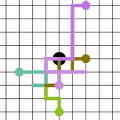Lifted samplers form a class of Markov chain Monte Carlo methods which has drawn a lot attention in recent years due to superior performance in challenging Bayesian applications. A canonical example of such sampler is the one that is derived from a random walk Metropolis algorithm for a totally-ordered state space such as the integers or the real numbers. The lifted sampler is derived by splitting into two the proposal distribution: one part in the increasing direction, and the other part in the decreasing direction. It keeps following a direction, until a rejection, upon which it flips the direction. In terms of asymptotic variances, it outperforms the random walk Metropolis algorithm, regardless of the target distribution, at no additional computational cost. Other studies show, however, that beyond this simple case, lifted samplers do not always outperform their Metropolis counterparts. In this paper, we leverage the celebrated work of Tierney (1998) to provide an analysis in a general framework encompassing a broad class of lifted samplers. Our finding is that, essentially, the asymptotic variances cannot increase by a factor of more than 2, regardless of the target distribution, the way the directions are induced, and the type of algorithm from which the lifted sampler is derived (be it a Metropolis--Hastings algorithm, a reversible jump algorithm, etc.). This result indicates that, while there is potentially a lot to gain from lifting a sampler, there is not much to lose.
翻译:暂无翻译



